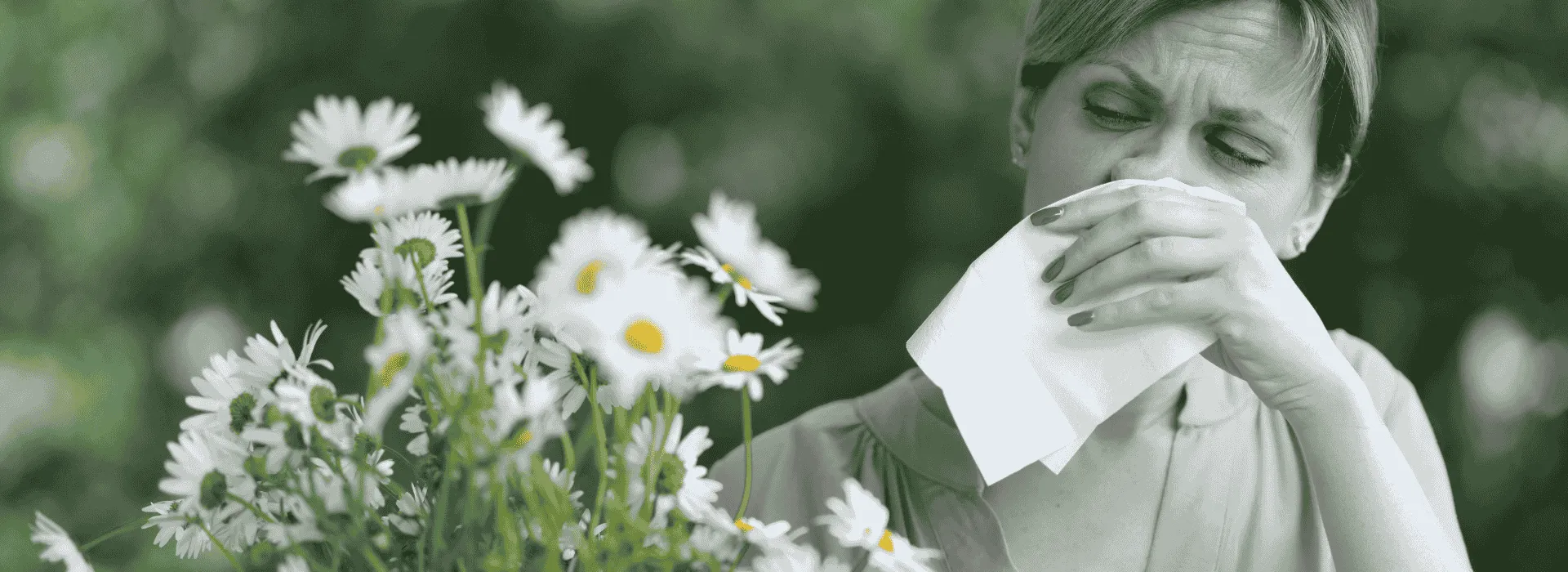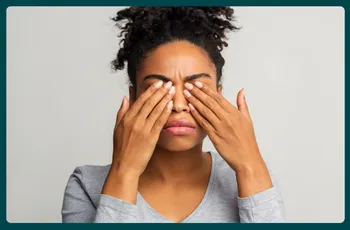Hay fever and blocked ears: Causes, symptoms & treatment
Written by the editorial staff writer at Hola. Medically Reviewed by Dr. Ammar AL-ANI, MBChB, CCBST, AMC. Blog updated on 04 January, 2025. Originally published on 12 July, 2025.

Contents

Overview
If your ears feel clogged or pressure builds up every spring, hay fever might be the reason. Hay fever is very common in Australia, affecting around one in five adults1.
Many Australians who experience hay fever (allergic rhinitis) also notice their ears feeling blocked or full during peak pollen seasons. Understanding how airborne allergens contribute to ear congestion can help you manage both symptoms more effectively.
Connection between hay fever and ears
The ears and nose are more closely connected than they may seem. A small passage called the Eustachian tube links the middle ear to the back of the nose and throat.
When hay fever flares up, irritation and increased mucus production occur in the nasal passages and throat. This can cause the Eustachian tube to become blocked or function less efficiently, leading to symptoms such as ear pressure, popping sensations, or muffled hearing.
In simple terms: Allergies → nose and throat swelling → impaired Eustachian tube function → blocked or “full” ears.
Causes
Ear congestion during allergy season can occur due to several related factors, including:
- Inflamed nasal passages triggered by allergic reactions
- Excess mucus production blocking the Eustachian tube
- Sinus congestion caused by pollen or dust allergies, increasing pressure in the ear, nose, or throat
- Swelling of tissues around the ear and throat
- Secondary ear or sinus infections due to prolonged blockage
Symptoms
Common symptoms of ear congestion linked to hay fever include:
| Symptom | Description |
| Ear fullness or pressure | Feels like the ears are “clogged” or underwater |
| Mild hearing loss | Sounds may seem muffled, distant, or dull |
| Ear popping | Frequent need to “pop” or clear the ears |
| Itchy or irritated ears | Often linked to allergic inflammation |
| Sinus congestion or headache | Frequently occurs alongside ear blockage |
Note: If you experience severe ear pain, fluid discharge, dizziness, or noticeable hearing loss, consult a doctor promptly, as these may indicate an ear or sinus infection.
Feeling unwell? Consult an Australian-registered GP online, 24/7.
Treatment options
Hay fever-related blocked ears are usually manageable with a combination of self-care, over-the-counter medications, and prescription treatments when required.
Over-the-counter relief
The following treatments may help reduce allergy symptoms and ease ear congestion:
- Antihistamines – help reduce the allergic response
- Decongestant nasal sprays – relieve sinus and nasal pressure (short-term use only)
- Saline sprays or rinses – naturally clear nasal passages
- Pain relief medication – for discomfort if needed
Doctor’s note: Always follow label instructions or seek GP advice before starting new medications.
Home remedies
Simple lifestyle measures can also help reduce ear blockage during allergy season:
- Stay indoors when pollen counts are high (check Australian pollen forecasts)
- Use steam inhalation or warm compresses to ease congestion
- Keep windows closed during windy days or peak pollen seasons
- Drink plenty of fluids to help thin mucus
- Try gentle ear-popping techniques (such as swallowing or yawning); avoid inserting objects or cotton buds into the ear
Prescription treatment (when OTC isn’t enough)
If symptoms are persistent or severe, your GP may prescribe:
- Stronger corticosteroid nasal sprays
- Combination antihistamine–decongestant sprays
- Short courses of oral corticosteroids for severe inflammation
- Allergy immunotherapy for recurring or long-term hay fever
Online telehealth services, such as Hola Health, can prescribe these medications when clinically appropriate.
Prevention tips
You can reduce the risk of hay fever-related ear blockage by following these practical steps:
- Start antihistamines early before symptoms flare up
- Keep your home dust-free and consider using air purifiers
- Avoid outdoor activities during high pollen times
- Shower after being outside to remove pollen from skin and hair
- Sleep with windows closed during spring and summer
When to consult a GP
Seek medical advice if:
- Blocked ears last longer than a week despite home treatment
- You experience severe ear pain, fever, or fluid discharge
- You have dizziness or balance problems
- Over-the-counter remedies do not provide relief
- You have frequent hay fever flare-ups or sinus infections
How Hola Health can help
Hola Health’s online doctors can assess your symptoms and recommend appropriate treatment for hay fever and blocked ears. They can provide prescriptions, medical certificates, and ongoing allergy management — all from the comfort of home.
Consultations are bulk-billed for eligible patients, making care convenient and accessible.
Don’t let hay fever block your day — or your ears. Book an online consultation with an Australian GP at Hola Health today.
Conclusion
Hay fever may be seasonal, but persistent ear blockage does not have to be. With effective treatment and preventive care, symptoms can be well controlled. If concerns continue, seeking medical advice is the best next step.
FAQs
Can hay fever really cause blocked ears?
Yes. Allergy-related inflammation and mucus can affect the Eustachian tube, leading to pressure and ear congestion.
How long does ear congestion from allergies last?
This varies. For some people, symptoms ease once exposure to allergens reduces. For others, congestion may persist until inflammation is properly treated.
What’s the fastest way to relieve ear pressure at home?
Swallowing, yawning, or gentle jaw movements may help open the Eustachian tube. Using a saline nasal spray and keeping your head elevated can also provide relief. Avoid placing anything inside the ear.
Should I use ear drops for hay fever-related blockage?
Not usually. Allergy-related ear blockage affects the Eustachian tube rather than the ear canal. Ear drops are only recommended if an infection or wax buildup is diagnosed by a doctor.
Can hay fever cause ear infections or hearing loss?
Ongoing nasal congestion can lead to fluid buildup in the middle ear, increasing the risk of infection and temporary hearing changes. Proper allergy management reduces this risk.
Reference
Hay fever - reference linkProviding consult for
- Cough
- Nausea & vomiting
- Fever
- Hayfever
- Fatigue
- Sore throat
- Acne
- Gout
- Eczema
- Rosacea
- Sunburn
- UTI
- Erectile dysfunction
- Contraception
- Morning sickness
- Morning after pill
- Prostate health
- Anxiety
- Depression
- Stress
- Grief & loss
- Premature ejaculation
- Asthma
- Blood pressure
- Diabetes
- Cholesterol
- Migraines & headaches
- Allergies
- Heartburn & reflux
- Sleep disorder
- Gastro
Related Articles
How Asthma Action Plans Help You Breathe Easier
Know All About The Summer Skin Rashes
Disclaimer
This blog is for general informational purposes only and does not indicate that Hola Health provides all treatments or preventive measures mentioned. It is not intended to be a substitute for professional medical advice. Always seek the guidance of your doctor or other qualified health professional with any questions you may have regarding your health or a medical condition. For emergencies please immediately contact 000. Any medical topics discussed are intended to educate, not to imply availability through Hola Health.




